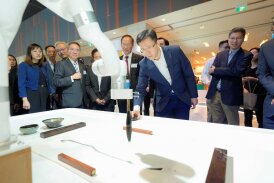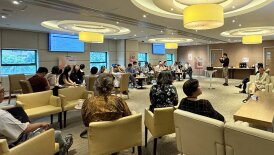

Thanks to sophisticated algorithms that enable recommendations based on user interests and behaviour, users of today’s Internet and social media find it more than easy to access news, information, entertainment and even to meet people with similar interests. A young scholar at the forefront of research into large-scale graph data analytics is Dr Yang Renchi, an Assistant Professor at the Department of Computer Science at Hong Kong Baptist University (HKBU). He shares the trials and tribulations he endured during his award-winning work, which has revolutionised the way digital information is presented and analysed while slashing the amount of time required to do so.
Questioning Researcher Strives for Novel Knowledge
Ever since his undergraduate studies, Dr Yang has been intrigued by how the application of mathematics and algorithms can solve real-world problems. At internships he undertook at notable enterprises such as Baidu, Tencent, and Microsoft, he gained hands-on experience in collecting feedback from customers for the purpose of developing or refining products. This planted the seeds for his scholarly pursuit, and he eventually obtained a PhD from the Nanyang Technological University in Singapore followed by a two-year postdoctoral stint at the National University of Singapore.
Dr Yang elaborates on the reasons for his career path: “After completing the degree, I felt that I still have so much to learn. I have opted for an academic career because I saw a lot of potential in making a real-life impact by leveraging data not only to help users access news and information but also for providers to offer better services. Although we lack a ‘killer application’ in our field, like natural language processing or facial recognition where users can hear or see the benefits, the behind-the-scenes work in big data is equally, if not more, important.”
Game-Changing Ways to Analyse Large-scale Data
With advancements in online services and social networks, the amount of user data has grown exponentially. During his PhD studies, Dr Yang worked tirelessly on novel solutions that enhance the efficiency of the machine-learning process. His resolute work came to fruition when he won the Best Research Paper Award at the prestigious Very Large Data Bases Conference (VLDB) in 2021.
The breakthrough model is one that is able to complete the processing of huge graphs containing billions of edges within 12 hours on a single machine. This is a significant reduction from the seven days needed on a state-of-the-art machine using conventional methods. This new level of competence is enabled by blending together and expressing user information attributes as vectors, making it easier for algorithms to analyse the information to make meaningful predictions and suggestions.
“To win this accolade with only the third project in PhD is such an honour. We are working with industry partners to explore the possibility of deploying the technique to enhance their online services,” says an excited Dr Yang excitedly.
Highs and Lows of a Scholarly Life
Despite his early career achievements, Dr Yang has also seen his share of ups and downs. In his first PhD project, the team realised a fundamental issue only when they had nearly completed the study – this was that the theorem their work had referenced from a published article was incorrect. As this would deem that their subsequent examination was invalid, they needed to start over again. Despite this demoralising episode, Dr Yang and his teammates persisted and were able to get back on track to publish their study.
“The lesson was accepting that we cannot go back in time to change our actions, but we can find new and meaningful ways to address the issues at hand. I had to constantly reassess my actions, look for alternatives, search for new information, seek out new ideas and critically review them. The process helped to consolidate my theory base and gave me new knowledge in diverse areas, which became highly beneficial for me. Rather than seeing this as a challenging chapter, it really was a blessing in disguise,” he says in a positive tone.
Embracing Teaching and Learning at HKBU
Taking note that HKBU has an outstanding reputation in computer sciences and in providing support to young academics, Dr Yang joined the University in January 2023. He looks forward to creating high-impact research with the support of outstanding scholars like Professor Xu Jianliang, Head of the Department of Computer Science, as well as Professor Byron Choi and Dr Huang Xin in the Database Research Group.
Despite being a relatively green Faculty member, Dr Yang’s enthusiasm for teaching has already shone through brightly. He is particularly impressed by the students’ eagerness to acquire new knowledge, and this fuels his sense of responsibility to find ways to best address their learning needs. “My students often ask questions which I had never considered before. I must better prepare for class and think about how to articulate the topics. I also find myself updating my knowledge regularly. I am really enjoying this two-way learning process,” he says with a look of satisfaction.
Sound Advice for Young Researchers
In sharing his experience, Dr Yang encourages students considering an academic career to find the research direction of interest to them and then to persist in pursuing it: “I only published my first article in the third year of my PhD, while other students may have begun publishing in their first or second year. You may feel discouraged, but it is important to stay focused on your work, accumulate knowledge and use it wisely. You will then look back and feel proud of the progress that you have made.”
He also urges students to keep reading, thinking, and learning, and to look out for new developments on the horizon: “When we get to know something, we can find more interesting problems and challenges. This helps us preserve the passion for research, and for learning and creating new knowledge.”
The Future of Big Data
Looking to the future of large-scale graph data analytics, Dr Yang acknowledges that the recommendation function of algorithms may immerse users in their own interest circle, making it a breeding ground for potential harm if ‘extreme’ information be fed. Therefore, when platforms make such suggestions, they should strike a better balance between the users’ interests and different kinds of information.
With the use of digital technology in a growing range of industries, there is also a great potential for big data analysis to be applied. “In my future projects, besides improving the efficiency of algorithms, I am interested in working with colleagues from other disciplines. I look forward to creating new solutions to tackle complex societal problems of product recommendations, medical drug discovery, and financial fraud detection, or logistics planning,” Dr Yang concludes.
上一则消息
30.10.2023
下一则新闻
19.10.2023



